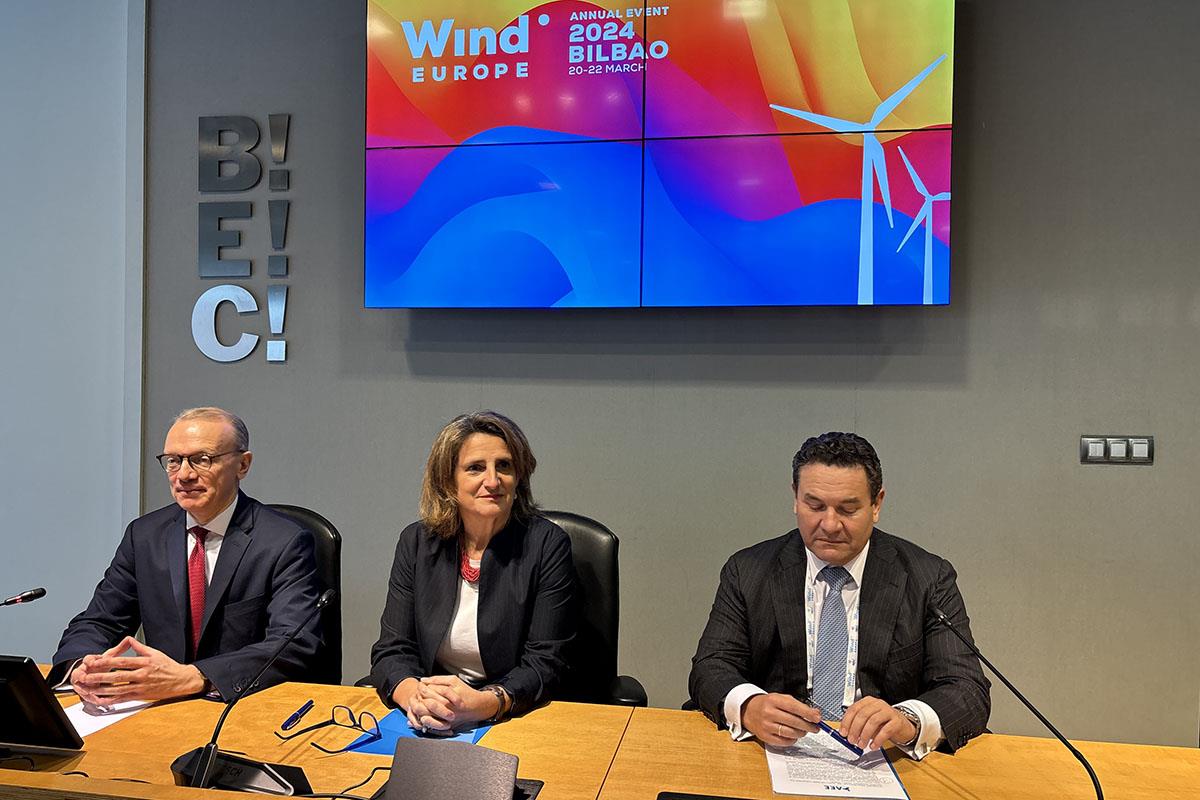Ribera and the Spanish Wind Energy Association seal commitment to the sector with the signing of the national Wind Energy Charter
News - 2024.3.20
 The Vice-President of the Government and Minister for Ecological Transition and Demographic Challenge, Teresa Ribera, during the annual WindEurope meeting
The Vice-President of the Government and Minister for Ecological Transition and Demographic Challenge, Teresa Ribera, during the annual WindEurope meeting
"Today I come with the satisfaction of being able to sign the Charter with the Spanish industry," announced the vice-president on her arrival at the annual WindEurope meeting in Bilbao. "We are facing a scenario with new competitors, in a geopolitical context in which new powers are making a similar commitment to Europe and Spain, leading us to defend and emphasise the importance of the wind industry on our continent and in our country," explained Ribera.
A sector led by Spanish industry
Wind power is already the main source of electricity production in Spain, covering more than 24% of demand in 2023. Not surprisingly, Spain is the fifth country in the world in terms of installed wind power capacity, after China, the US, Germany and India. This leading position is reinforced by the signing of the Spanish declaration.
"I think we can congratulate ourselves today. Being able to sign this Spanish Charter, in which we not only show the commitment of the administrations to promote the constant improvement of the sector in a different way, but also the capacity of the industrial sector to self-impose these commitments and make them public, is a major step", said the vice-president during the signing ceremony of the Charter. "These are extraordinarily intense years, things happen very quickly, but for them to happen very quickly and well, progress like this is essential," she said.
Environmental and social excellence
In this regard, the Declaration's commitments include improving the integration of projects in the territory, pursuing environmental and social excellence, and including criteria associated with added value in both auctions and tenders for grid access capacity for a key technology in Spain's energy transition.
Moreover, the national industry is capable of producing more than 90% of the components of a wind farm, which makes Spain the fifth largest exporter, only surpassed by Germany, Denmark, China and India. In 2022, foreign sales of these components exceeded €2.5 billion, bringing the contribution to GDP of a sector on which 39,015 direct and indirect jobs depend, according to industry data, to almost €5.9 billion.
To protect this industry from strong international competition, the declaration also commits to strengthen its production capacities through a programme of aid to boost the renewable value chain, to give it greater visibility by updating the indicative auction calendar up to 2030 and to promote the creation of a "Made in Europe" label to distinguish the best technologies.
Commitment in line with the European Wind Charter
On 19 December, Spain, together with other member states and the European wind sector, signed the European Wind Charter, a joint commitment that seeks to promote a European wind value chain that is resilient, sustainable and competitive, that provides security of supply and that has the right conditions to drive the energy transition in the EU at the necessary pace.
The European Wind Charter identifies coordination between stakeholders, planning and regulatory frameworks, the competitiveness of the wind industry ecosystem and employment growth in the European wind sector as the main tools to address the main challenges of the sector. To face this context successfully, it proposes six lines of action, which include greater visibility and robustness in generation deployment forecasts; an improved design of renewable auctions, including added value criteria; improvements in the decision-making processes of the companies themselves to align them with these principles; the reduction of volatility in the sector with the promotion of long-term agreements; and the monitoring of international trade practices to avoid anti-competitive actions and the reinforcement of the European wind sector's manufacturing capacities.
Non official translation




